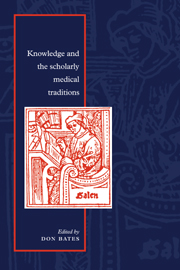Book contents
- Frontmatter
- Contents
- List of illustrations
- List of contributors
- Acknowledgements
- 1 Scholarly ways of knowing: an introduction
- Part 1 Scholarly medicine in the West
- 2 Epistemological arguments in early Greek medicine in comparativist perspective
- 3 Autopsia, historia and what women know: the authority of women in Hippocratic gynaecology
- 4 The growth of medical empiricism
- 5 Scholarship and social context: a medical case from the eleventh-century Near East
- 6 The experience of the book: manuscripts, texts, and the role of epistemology in early medieval medicine
- 7 Artifex factivus sanitatis: health and medical care in medieval Latin Galenism
- 8 Epistemology and learned medicine in early modern England
- Part 2 Chinese traditional medicine
- Part 3 Āyurvedic medicine
- Part 4 Commentaries
- Index
8 - Epistemology and learned medicine in early modern England
Published online by Cambridge University Press: 01 February 2010
- Frontmatter
- Contents
- List of illustrations
- List of contributors
- Acknowledgements
- 1 Scholarly ways of knowing: an introduction
- Part 1 Scholarly medicine in the West
- 2 Epistemological arguments in early Greek medicine in comparativist perspective
- 3 Autopsia, historia and what women know: the authority of women in Hippocratic gynaecology
- 4 The growth of medical empiricism
- 5 Scholarship and social context: a medical case from the eleventh-century Near East
- 6 The experience of the book: manuscripts, texts, and the role of epistemology in early medieval medicine
- 7 Artifex factivus sanitatis: health and medical care in medieval Latin Galenism
- 8 Epistemology and learned medicine in early modern England
- Part 2 Chinese traditional medicine
- Part 3 Āyurvedic medicine
- Part 4 Commentaries
- Index
Summary
Preface
This paper poses the question as to whether and how far it is possible to talk of epistemology in relation to a learned tradition in medicine, when that tradition is well established and is concerned to emphasize the unchanging nature of its knowledge in the struggles against its competitors in the medical market place. Some of the discussion bears upon the question of why learned medicine came to die out in England, but this issue is not the main focus of the paper.
I have not spelled out modern-day historiographic categories (for instance, epistemic or sociological, or to use more old-fashioned terms from the history of science and medicine, internal or external). They express dichotomies which for the sixteenth and seventeenth centuries are not historically grounded. (For instance, a sixteenth-century divine or politician would not have agreed that a point of religious doctrine was a matter either of epistemology or sociology – even if the latter could have been recognized at the time – though it might be seen as a blend of both. Our modern scholarly traditions and disciplinary rivalries mean that one or the other tend to be given priority.)
Introduction
The epistemology of Western learned or scholarly medicine was not completely successful; it did not produce knowledge of such certainty as to kill off all other rivals in the medical market place. It is also doubtful if in early modern Europe learned medicine was using epistemology in any heuristic sense to create new knowledge.
- Type
- Chapter
- Information
- Knowledge and the Scholarly Medical Traditions , pp. 151 - 174Publisher: Cambridge University PressPrint publication year: 1995
- 3
- Cited by



